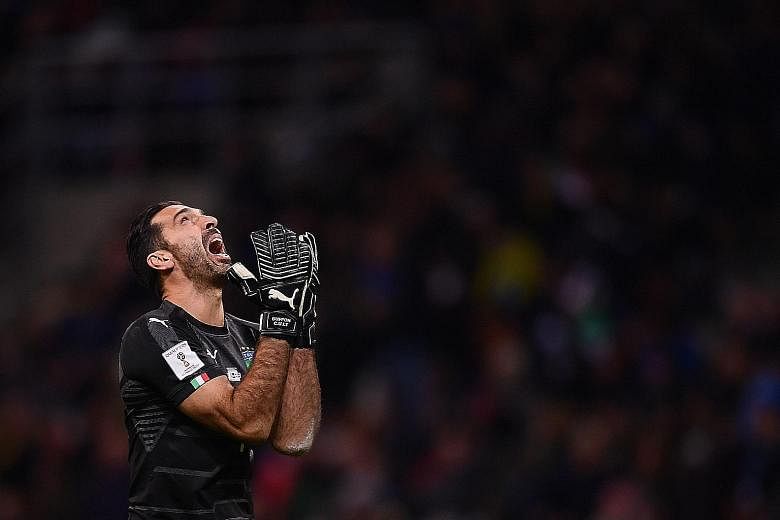MILAN • Apocalypse, how? Carlo Tavecchio, the president of the Italian Football Federation, had defined the prospect of missing out on the 2018 World Cup as a disaster of biblical proportions.
Now the worst has come to pass, with the Azzurri failing to qualify for football's showpiece event for the first time in 60 years after losing their play-off tie with Sweden 0-1 on aggregate on Monday. All that remains for a proud football nation is to analyse where it went wrong.
A partial answer could be found on the pitch at San Siro. Italy dominated with more than 75 per cent of possession, yet lacked the subtlety to unpick a packed defence, pumping crosses into a penalty area where their opponents held a clear height advantage.
A lack of nuance in the final third has been an problem for a team that have scored just three times in their last six competitive fixtures.
More revealing scenes, though, were playing out on the bench.
Midway through the second half, a member of Italy's coaching staff asked Daniele De Rossi to warm up. The midfielder reacted angrily, appearing to reply: "Why should I go on? We don't need a draw, we need a win."
His words were accompanied by a gesture in the direction of Lorenzo Insigne. De Rossi would later explain that he was making a broader point about the need for attackers, rather than seeking to single any individual out, yet many will wonder how the Napoli forward could be overlooked by coach Gian Piero Ventura.
Insigne is in the prime of his career, having scored 18 league goals from the left wing for Napoli last season. The 26-year-old is the only Italian valued at over €100 million (S$160 million) by the CIES football observatory, and yet never made it onto the pitch on Monday - after making only the briefest of cameos in the first leg.
Nobody who has followed Ventura's career could even be all that surprised. It is not that he underrates Insigne so much as that the coach is extraordinarily rigid in his selection process - a man fixated on square pegs and square holes.
Insigne is a wide forward and Italy were lined up in a 3-5-2. Therefore, there was no space available.
Italy were fluid under Antonio Conte, a dynamic shape-shifting collective. Under Ventura, the connections between defence, midfield and attack have all but disappeared.
The fact that players felt compelled to meet without him after the 1-1 draw at home to Macedonia might suggest a lack of faith in his ability to lead them. Ventura's coaching CV was always a modest one, when compared to his predecessors.
Ventura was 68 when he took the job, and was perceived to have the right temperament. That he was not up to this task, in hindsight, is clear. Italy's talent pool has dwindled since their 2006 World Cup win and yet Ventura had more to work with than Conte before him.
The likes of Ciro Immobile and Andrea Belotti have blossomed at club level in the last 18 months. It is unforgivable that Insigne's club-mate Jorginho, a key pillar of the Napoli team leading Serie A, had not made his competitive debut for Italy before Monday.
Which is not to say that all blame should be placed on one man's shoulders. Ventura will doubtless be removed from his post, but whether or not a similar fate awaits the men who appointed him remains to be seen.
Tavecchio's presidency has been turbulent from the get-go, with many Italians outraged that he could be elected to office in the first place despite making remarks about "banana eaters" flooding the league.
There is a valid discussion to be had about whether a growing foreign presence - 53.3 per cent of Serie A players hail from abroad, according to Transfermarket.com - has harmed the national team, but never on such grim racist terms.
Supporters of Tavecchio might argue that he has otherwise been a moderniser: playing his part in the introduction of the video assistant referee in Serie A. Both Italy and Sweden might have had several penalties at San Siro had Fifa been similarly proactive.
It was telling, though, that the beaten team did not dwell on the latter point at full-time.
No slow-motion replay could change the reality that they will not go to the World Cup next year.
THE GUARDIAN

